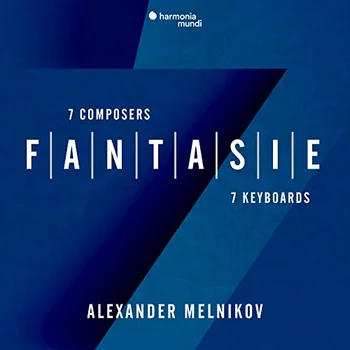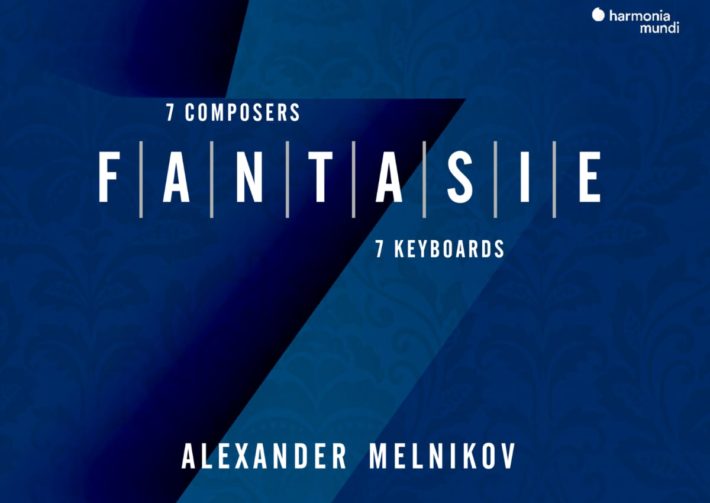Alexander Melnikov’s new disc is as much an exploration of keyboards as it is the fantasie – 7 different instruments are presented (three from the pianist’s own collection), each paired with a work of the same era. This concept album calls to mind his 2018 “Four Pianos – Four Pieces” but here, he traverses a wider range of eras from the Baroque to the 20th-century.

In CPE Bach’s Fantasia, Melnikov uses a ‘tangent piano‘. Something of a rarity, it has quite an unusual sound, best described as a cross between a harpsichord and a dulcimer. The pianist shows us the instrument’s expressive versatility: the opening passage’s repeated chords have an atmospheric ring which communicate desolation and emptiness. All of that changes at 0’21”: as the harmonies shift and the texture thickens, we hear a pronounced strike in the bass register that is of a completely different character. Melnikov increases the emotional intensity at this point and the music becomes almost choral in nature. Even with different characters appearing, the prevailing quality of the tangent piano is one of delicacy and fragility. The four-minute mark, for instance, has the subtlest of pianissimos that still glimmers.
Melnikov’s own fortepiano takes center stage in two Mozart fantasias of which the D minor is especially nice. The instrument’s nuanced sound profile is evident when he creates the “echo effects” in the opening arpeggios; fulsome resonance greets the ears in the louder moments while the softer ones are translucent. An added touch is the pianist’s rhythmically fluid approach, which prevents the patterns from sounding rote or predictable. Upper registers of fortepianos in general can have the tendency to sound plunky if not well-managed, but such is not an issue here. The section at 0’55”, as an example, is played with plenty of care and the elegant phrases are tinged with an aching sadness.
Having recently reviewed François-Frédéric Guy’s Chopin‘s Op. 49 Fantasie on a 1905 Pleyel, I was curious to hear what Melnikov’s (on a restored 1885 Érard) had to offer. First off, the two pianos sound quite different, though one isn’t necessarily better than the other. The Pleyel has a round and thick tone; the Érard has a similar mellowness but sounds more cavernous. Then, there’s also the difference in interpretation. Guy’s is more contemplative as he opts for more legato and a consistency in the march-like rhythm. Melnikov’s, on the other hand, is a bit more rhapsodic. More liberties in tempo mean more ebbs and flows that, however, don’t feel out of place; They help create an image of an observant wanderer meandering through a path. As with the other works, Melnikov knows how to use the instrument’s temperament to maximum effect. Listen to how the opening passages present an ongoing dialogue between two characters: the austere bass and the wistful treble. Speaking of the bass, the lower register on this Érard is impressive: it has something beyond the substance and depth of a modern piano. Perhaps it is a velvet overtone that is forgiving even in the most intense moments like 4’10”. Melnikov’s artistry helps elevates the instrument’s pleasing resonance into a full orchestral sound.
Busoni’s Fantasia in modo antico (track 10) has a fairly active baseline, so a piano like the Bechstein Model B is a fitting choice with its robust lower register. Melnikov aptly maintains a smooth legato in the left hand octaves, which subsequently lends a melodic quality to the line. The opening section does feel a bit subdued where more overt authority would do, but he nonetheless established a good contrast to the fugal section that appear later—the finger work in the fast passages is clean as can be and the contrapuntal textures easy to follow as a result.
Given the interesting program and theme, the liner notes are disappointingly conventional. There is usual musical/historical analysis but no light shed upon the relationship between the chosen instruments and the corresponding works—maybe the objective is to leave the listener to figure this out? The included photos of each instrument don’t make up for the gap but are welcome additions.
Melnikov is most fortunate to have a series of stellar-sounding instruments at his disposal, but what makes all the difference is his ability to bring out their best qualities in each work. The album’s creative and immersive concept is brought to life in an illuminating listening experience.
Recommended Comparisons
Bezuidenhout/Podger | Melnikov | Van Immerseel | Levin | Melnikov
Fantasie
Alexander Melnikov
Harmonia Mundi, CD HM902702



















